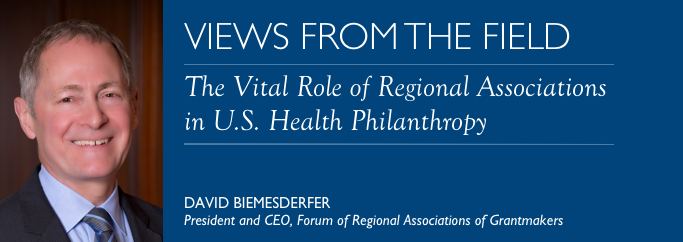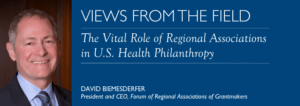
Last year I was walking the halls of Florida’s Capitol in Tallahassee. At the time I was President and CEO of Florida Philanthropic Network (FPN), a statewide network of philanthropic organizations working to build philanthropy to build a better Florida. FPN had just presented a health policy briefing in Tallahassee for elected officials and state policy leaders.
The leader of a prominent nonprofit health care service and advocacy organization stopped me in the hallway. She expressed her deep gratitude that Florida’s philanthropic sector, through FPN, had recently become more active and visible in health policy. She acknowledged that philanthropy’s voice was a unique, independent, and powerful one, in part because it does not, in her words, have a “dog in the fight” and was not seeking government dollars (as were her organization and many of her colleagues). “Please keep it up,” she implored. “Your voice is so important.”
That exchange exemplifies for me not just the important role that philanthropy can play in the public policy arena, but also the important role that regional philanthropy associations like FPN can play in U.S. health philanthropy. In January, I left my role at FPN to become President and CEO of the Forum of Regional Associations of Grantmakers, which is a nationwide network of 33 regional philanthropy associations like FPN. Collectively, our network represents 5,500 organizations, covering all but a handful of states, making us the largest network serving philanthropy in America. One recent trend in our network is a growing focus on health-related issues and policies.
Currently, at least 12 regional philanthropy associations operate health-focused working groups, which provide a vital space for funders to come together for learning, sharing, and sometimes providing a voice for philanthropy on health-related issues in the region, whether that region be a state, multiple states, part of a state, or a metropolitan area. These groups typically include both funders focused exclusively on health as well as funders with broader portfolios that include health.
For example, Forum member Philanthropy Ohio operates a member-driven health initiative that “envisions a future where Ohio communities – including the philanthropic sector – and the health system support health promotion and disease prevention as well as patient-centered, quality care accessible by all Ohioans.” Through this initiative, Philanthropy Ohio supported Medicaid expansion in Ohio, testifying at hearings and signing on to the amicus brief submitted to the Supreme Court defending Governor Kasich’s expansion. Philanthropy Ohio also submitted comments opposing the Healthy Ohio Waiver that the state submitted to the Centers for Medicare and Medicaid Services this summer.
In addition to taking positions on health policy issues, a growing number of regional philanthropy associations are playing a more visible role in providing credible, independent information and research on health policy issues. FPN, for example, has issued briefs and papers on the state of children’s health coverage in Florida, Florida’s Medicaid choice, and philanthropy’s role in the Affordable Care Act.
Regional associations are also providing high-quality educational programs to inform the work of health funders of all types. Recent health-focused programs presented by Southern California Grantmakers’ Health Care Funders Peer Group, for example, covered issues such as Health Information Exchanges, Los Angeles County’s Community Health Improvement Plan, and the impact of air quality on health, community, and justice in Southern California, which was done in collaboration with SCG’s Environmental Funders Group. While most of its health programs are presented through SCG’s Health Care Funders Peer Group, SCG is also finds that cross-pollinating programming on health and the environment brings needed attention to climate change and its impact on health.
Further north, Northern California Grantmakers’ Bay Area Health Funders Group recently hosted a half-day session on integrating an equity lens in health foundation practices. On the other side of the country, the Southeastern Council of Foundations, which covers 11 states in the Southeast region, hosts an annual summit for health legacy foundation CEOs. The list goes on.
If you are a national health funder, or a health funder covering several different regions of the country, these regional health-focused affinity groups and networks are an invaluable resource for your philanthropic work in those regions. These groups can help you engage with local health funders and partners in an effective and authentic way, to learn who is funding what on the ground in the region and what they are learning; to gain new knowledge about critical health needs, gaps, and trends in the region; and much more.
There is also a growing understanding that issues of health do not stand alone; that cross-sector collaboration and co-creation of solutions across domains is critical, as demonstrated by the intersecting health-environment work of Southern California Grantmakers. Regional philanthropy associations play an increasingly vital role in bringing funders from many issue areas together to develop relationships and an understanding of complex systems and the consequences of policy. This makes every regional philanthropy association a resource to health funders, whether or not it has a specific health funder working group.
The Forum is currently undertaking the implementation of a new vision. We intend to be the place where philanthropy’s infrastructure comes together, expanding our network to include national philanthropy-serving organizations (PSOs) in the field. These national PSOs include national affinity groups in philanthropy that are issue-based (like Grantmakers In Health or Grantmaking in Aging), identity-based (like A Philanthropic Partnership for Black Communities (ABFE) or Funders for LGBTQ Issues), or practice-based (like Grantmakers for Effective Organizations (GEO) or Grants Managers Network).
As part of this new vision, the Forum plans to spend more time and resources connecting together the various like-minded affinity groups that are operating among the 33 regional philanthropy associations, such as the regional health funder affinity groups. We want to do a better job of helping these regional groups learn from each other, share resources and ideas, explore potential partnerships, and more. We also hope to better connect the regional health funder affinity groups with national PSOs like Grantmakers In Health, Health and Environmental Funders Network, Funders Concerned About AIDS, and others. By bringing together the national groups’ deep content knowledge with the regional associations’ deep knowledge and connections in their regions, the Forum can help them work together in a much more comprehensive, effective, and systematic way than what is occurring today. We believe this will reduce duplication and increase collaboration within philanthropy’s infrastructure, and will greatly enhance how all the groups work to support, inform, and advance the philanthropic sector.
As the Forum moves forward to implement our new vision, we look forward to continuing to engage with Grantmakers In Health and our other national PSO colleagues and explore new ways for us to work together better. Our ultimate goal is to more fully leverage our collective resources so that philanthropy can be as effective as possible in improving the health of our communities.

